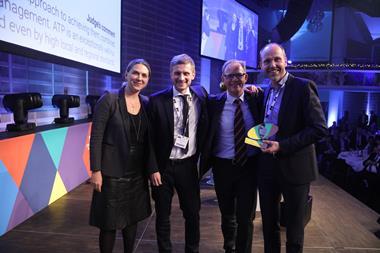Lex Heijnis, pension fund director and executive vice president at ABN Amro was not surprised when he got the call to announce his funds nomination in the IPE awards for Holland. “We believe we have the best fund in the world, and so were hopeful that we would win one of the country nominations” he said.
He saw the main rivals as other large corporate plans such as Unilever and Shell but said he and his team were always confident of winning. “There are some major differences between ourselves and the other plans, which probably made a difference to the judges. Ours is a hybrid plan, combining the solidity and security of a defined benefit (DB) with the flexibility offered by defined contributions (DC). That on the surface may not look all overly different to other schemes, but there is a major difference. Our members are free to make their own decisions on flexibility and security, regardless of income.
“In many other schemes, there is only such flexibility on offer over a certain threshold. What we offer is a vertical split in the fund, whereas other company plans have a horizontal split invoking the threshold referred to above.”
There is another distinction in the scheme, however, which relates to this split. “We administer the plan as a DC system, giving us the advantage that we do not have to keep the administrative records of a DB plan. This has the effect of reduced costs as a result of the DC administration, which is always good for our members.”
Members have shown interest in the choice that has been on offer since the it was introduced in July 2000 after the plans introduction in January of that year. To date, about 8% of the members have taken the opportunity to move funds to the potential higher return of the investment funds. Older members, however, seem to be keen to opt for the more conservative DB aspect of the plan. “It makes sense for older members who are getting close to retirement age to adopt that view, but it seems clear from our records that younger members are investing more in the risk products,” says Heijnis.
He adds that the plan is generating interest around the world, and points out that the awards themselves help to spread news of the scheme. “The awards help to spread ideas, allowing managers to look at other schemes and see their advantages or disadvantages. Of late, we have been challenged to make our plans cheaper and more competitive across Europe, as just one of many changes affecting the industry. The awards help us to take part in these changes, and hopefully show the way forward.”













